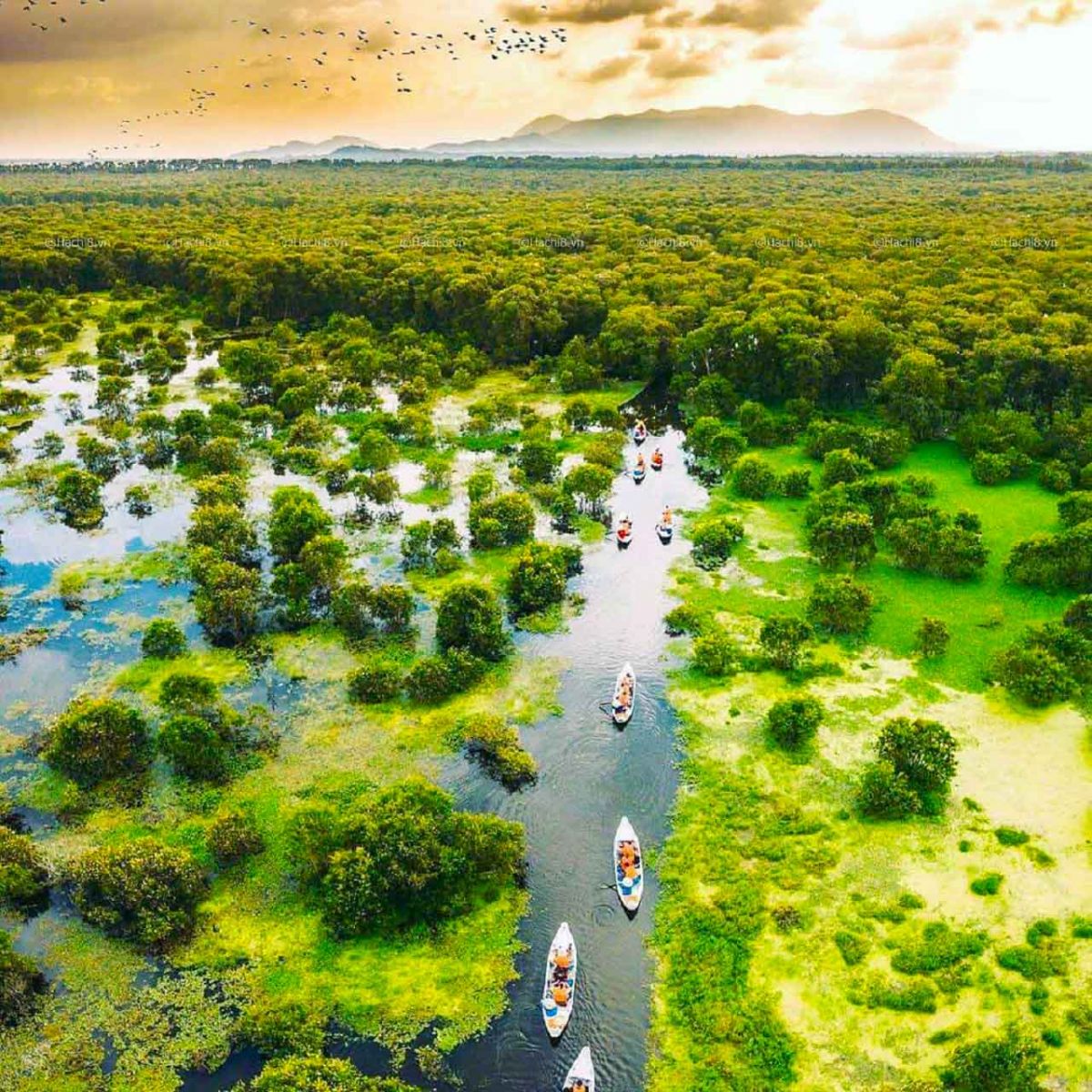The Mekong Delta in southern Vietnam is often described as a “water world,” where rivers, canals, and seasonal floods shape every aspect of life. This unique landscape has produced extraordinary biodiversity and rich cultural traditions that reflect people’s resilience in living with water. For travelers seeking a deeper connection, the Mekong Delta offers two intertwined experiences: its national parks, where wetlands teem with wildlife, and its craft villages, where heritage is woven, fired, carved, and carried forward by local hands.

National Parks: Sanctuaries of Biodiversity
-
Tràm Chim National Park (Đồng Tháp)
Known as a miniature version of the Đồng Tháp Mười wetlands, Tràm Chim covers nearly 7,500 hectares of seasonally flooded grasslands and lotus ponds. It is internationally recognized as a Ramsar site, home to over 230 bird species. The most iconic is the Sarus crane, with its tall stature and crimson head, which migrates here during the dry season. Visitors can take wooden boats through carpets of water lilies, watch flocks of storks at sunset, or learn how the park manages controlled flooding to preserve the ecosystem. -
U Minh Thượng National Park (Kiên Giang)
One of the few remaining peat swamp forests in Southeast Asia, U Minh Thượng is both mysterious and fragile. Beneath the swamp lies a thick layer of peat formed over thousands of years, storing immense carbon reserves. The park shelters otters, wild boars, python, and the rare fishing cat. Travelers can explore the forest on elevated wooden walkways, paddle through narrow canals, or visit nearby communities that rely on honeybee harvesting from melaleuca flowers. -
Trà Sư Cajuput Forest (An Giang)
Smaller in size but famous for its dreamlike scenery, Trà Sư is a flooded forest where canals are covered with bright green duckweed. Boat rides silently glide under tall cajuput trees while herons and egrets perch above. During high water season, the forest feels like an endless green carpet, perfect for eco-photography. Local guides explain how the cajuput trees prevent soil erosion and how villagers use their leaves for medicine and oil extraction. -
Phú Quốc National Park (Kiên Giang)
Covering nearly 70% of Vietnam’s largest island, this park protects tropical rainforest, mangroves, and coral reefs. Hiking trails lead through dense jungle alive with hornbills and macaques, while offshore, snorkelers find vibrant coral gardens. The park is part of the island’s push for sustainable tourism, balancing rapid development with conservation. Travelers can combine trekking, birdwatching, and visits to community-run pepper farms and fishing villages.
Together, these parks showcase the Delta’s ecological richness—from freshwater wetlands to peat swamps and tropical rainforests—while also highlighting the delicate balance between conservation and local livelihoods.
Craft Villages: The Cultural Soul of the Delta
Beyond its landscapes, the Mekong Delta is also defined by its craft traditions, shaped by the abundance of water and natural materials. While some villages are well known, others remain less celebrated yet deeply authentic:
-
Định Yên Mat Weaving Village (Đồng Tháp)
Once famous for its “ghost market,” where woven mats were traded at night under oil lamps, Định Yên is a symbol of Delta ingenuity. Families weave colorful sedge mats by hand, often in vibrant stripes or floral patterns. Though plastic mats have reduced demand, the village still welcomes visitors to see looms in action and hear stories of how mats were once a dowry gift in weddings. -
Mang Thít Brick & Pottery Village (Vĩnh Long)
Rising along the Cổ Chiên River are hundreds of old red-brick kilns, giving the village a striking skyline. For decades, Mang Thít supplied clay bricks and ceramics across southern Vietnam. The kilns are now less active, but artisans still fire pottery in traditional ways, shaping jars, pots, and decorative items. Walking among the giant kilns feels like stepping into an open-air museum of industrial heritage. -
Water Hyacinth Handicraft Villages (Tiền Giang & Long An)
Once considered an invasive plant clogging rivers, water hyacinth has become a source of sustainable income. Local artisans dry and weave its stems into baskets, handbags, mats, and even furniture eco-friendly products now exported abroad. Visitors can learn how villagers collect the plant, prepare fibers, and braid them into elegant designs. -
Traditional Boat-Building Villages (Cần Thơ & Kiên Giang)
The Delta was once navigated almost entirely by wooden sampans and cargo boats, crafted by hand in riverside yards. Though motorized boats dominate today, some families continue this heritage, repairing hulls and carving elegant wooden vessels. Travelers who visit can witness carpenters shaping planks with traditional tools and understand how waterways were the Delta’s lifelines.
These craft villages embody the Delta’s creativity—turning reeds, clay, wood, and even invasive plants into cultural treasures. By visiting, travelers help sustain not only family incomes but also the intangible heritage of resilience and adaptation.
Towards Responsible Tourism in the Delta
The Mekong Delta’s future lies in balancing nature and culture. Its national parks safeguard biodiversity, while its craft villages preserve ancestral knowledge. Both are vulnerable—to climate change, modernization, and neglect—but both also hold the key to sustainable development.
Responsible travelers can make a difference:
-
Choose eco-tours that reinvest in conservation.
-
Buy directly from artisans, ensuring fair income.
-
Respect seasonal rhythms, from bird migration to rice harvest.
-
Value authenticity over convenience.
By gliding silently through a flooded forest at sunrise or sitting beside a mat weaver at dusk, visitors join a larger story—one where rivers, people, and traditions remain in harmony. The Mekong Delta invites us to explore with care, so that its natural beauty and cultural soul endure for generations.
Plan Your Journey with Purpose
Make your next journey more than just a getaway. By booking through a local tour Vietnam operator or an eco travel agency Vietnam, you’re not just taking a trip—you’re supporting environmental education, habitat preservation, and ethical tourism.
Contact us to create your ideal itinerary. Let us help you craft a personalized itinerary with local guides, including eco-friendly homestays, organic farming experiences, and cultural exchanges.
Vietnam Responsible Tourism is a travel enterprise that associates with different Community-based Tourism groups with the aim to improve living conditions in remote mountain regions of Vietnam since 2017.



